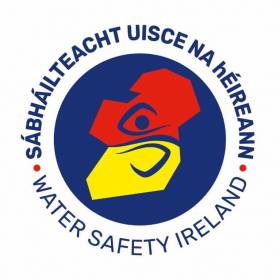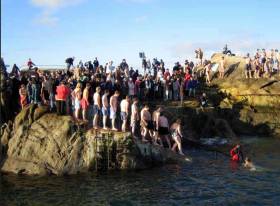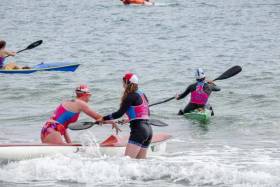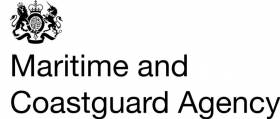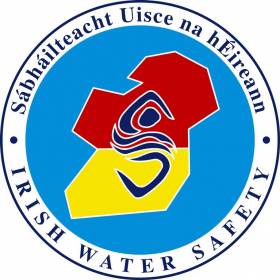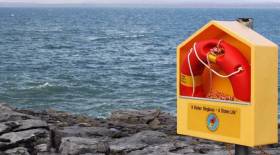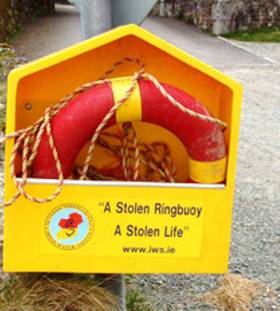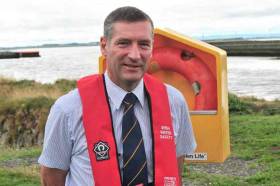Displaying items by tag: water safety
New Plan to Stop Vandalism of Public Lifebuoys but Why is Bill for Tougher Penalties Delayed?
I have no hesitation in saying that I detest those who vandalise public lifebuoys. Prosecuting and convicting such people, because their actions endanger life is, without question, absolutely necessary, but new legislation to make it easier for Gardai to do so and which would provide for a five-year jail sentence for those convicted has been held up in the Dáil for two years.
It is hard to understand why.
"Harbour Authorities spend €50,000 a year to replace an estimated 1,500 that are stolen or vandalised"
This equipment is a major part of the National Drowning Prevention Strategy. Local and Harbour Authorities provide ring buoys in yellow boxes but are having to spend €50,000 a year to replace an estimated 1,500 that are stolen or vandalised. Dublin City Council had to replace 500 last year at a cost of €20,000.
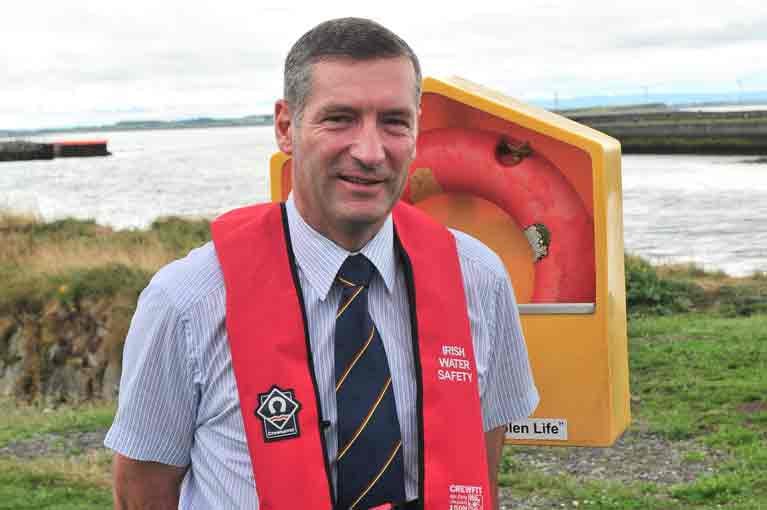 Chief Executive of Water Safety Ireland, John Leech
Chief Executive of Water Safety Ireland, John Leech
Cities, towns and urban areas are generally the locations where vandalism and theft are worst
Water Safety Ireland is working with Dublin Smart Docklands on a technological solution for the problem, according to the Chief Executive of Water Safety, John Leech.
• He discussed the problem on the Podcast below
Brave Fisheries Officers Saluted at Water Safety Awards
Inland Fisheries Ireland has acknowledged members of Fisheries Officers Stephen Kiely, Sean Cremin and Tom O’Riordan for their brave and combined valiant efforts in saving a life when they came across a person in difficulty during a routine fisheries patrol operation. The Fisheries Officers from Cork won SEIKO Just in Time Rescue Awards at this week's Water Safety Awards in Dublin, as reported previously by Afloat.
Sean assisted Stephen with the rescue by contacting the emergency services and directing them to the incident and Tom assisted Stephen by giving first aid and CPR instructions over the phone. Stephen has Swift-Water training, which helped him to assess the situation. These staff members conducted themselves with a sense of civic duty and their actions on the day saved of a life.
The awards ceremony took place in O’Reilly Hall, University College Dublin on Tuesday the 26th of November.
Weather Forecast Increases Risk of Cold Water Drownings
The 22°C warm weather forecast for the bank holiday weekend increases the risk of drownings as warmer air temperatures can tempt people to go swimming in waters that are still cold (10°C coastal, 8°C inland) says Water Safety Ireland. Survival time is greatly reduced for someone immersed in cold water which drains body heat much faster than cold air.
The dangers of cold water immersion
When cold water makes contact with your skin, the cold shock response causes an immediate loss of breathing control, possible dizziness and panic. This dramatically increases the risk of sudden drowning even if the water is calm and you know how to swim.
For those who survive this but are unable to get out of the water, progressive body cooling leads to hypothermia and muscle cooling, making swimming more difficult or impossible. Children cool even faster than adults because they are smaller and have less fat.
What to do if you fall into cold water
Avoid swimming, stay calm and relax. Float or tread water and if possible get as much of your body out of the water because you will always cool faster in water than in air.
Wearing a lifejacket with a crotch strap will enable you to lessen heat escape by keeping your legs together and elbows by your side.
The dangers of a full moon on Good Friday 19th April
A full moon on Good Friday will cause spring tides. Strong rip currents will create a higher risk than usual for swimmers. The tidal streams will run very strong, posing a risk to those boating, angling, yachting, canoeing and any other water-related activities. Stranding will also be a risk for many walkers as the lower tide will expose even greater areas of the coastline. Parents should be particularly alert to providing constant uninterrupted supervision as Lifeguards will not be on duty at local authority beaches over the Easter weekend.
Those going afloat should carry a portable Marine VHF and/or a personal locator beacon and walkers should carry a mobile phone to call 112 in an emergency.
If you have not used your lifejacket or buoyancy aid since last year then you will need to carry out the following checks.
Ensure CO2 Cartridges have not been punctured and are firmly secured
Ensure all zips, buckles, fasteners and webbing straps are functioning correctly
Check that fitted lights are operating correctly
Check that the valve or lifejacket is not leaking by inflating the lifejacket overnight or immersing it in water checking for air bubbles
Always use your crotch strap when fitting your lifejacket
Detailed information on PFD’s here
Discard any faulty lifejackets by destroying them
Don’t Take Chances on Sponsored Holiday Swims
Irish Water Safety is concerned that many people planning to take part in sponsored Christmas and New Year swims may take chances beyond what is acceptably safe and are cautioning the public to minimize the length of time they remain in water due to the risk of hypothermia as water temperature is approximately 11° Celsius at sea and 5° Celsius in freshwater.
“Cold water immersion” and hypothermia can overwhelm the fittest of swimmers but steps can be taken to remain safe:
· Cold water cools muscles faster than during warmer summer swims and may cause an increased heart rate, dizziness, cramp and panic.
· Take great care walking down slipways, jetties, piers and over rocks as they may be slippery and cause you to fall.
· Swimmers should “Get In, Get Out and Warm Up”, avoiding extended periods of exposure.
· Before entering the water throw some water down the back of your neck to allow your body prepare for cold water immersion.
· Alcohol should be avoided before swimming as it impairs judgment and increases the risk of cold water immersion and hypothermia.
· Ensure that you have safe access and egress with appropriate shallow shelving, steps or ladders. Less agile people should be mindful that steps leading into the water might be dangerous due to the possible growth of algae. Organisers should ensure that slipways or steps have been cleaned of slime, weed and algae.
· Christmas Swim organisers should ensure that they provide comprehensive details of each event to the Irish Coast Guard and local Gardai.
· Ensure that you have lifeguards for the event and adequate safety cover depending on numbers in regard to rescue boards, kayaks, surf skis and safety boats.
· Check with the Safety Officer, who will advise and has the ultimate responsibility for making decisions.
· If the seas are rough and weather deteriorates, wait for a more suitable day to support your charity commitment.
On average, 127 people drown every year, eleven every month. Safeguarding your loved ones extends beyond Christmas and New Year swims to family walks by rivers, lakes and shorelines. A full moon on December 22nd and a new moon on January 6th will increase the risk of stranding on our coastline due to the strong spring tides.
At inland water sites, parents can be lulled into a false sense of security when visiting areas close to water hazards such as slurry pits, exposed drains, rivers and canals. Safeguard your children with constant uninterrupted supervision and make a New Year’s resolution to learn swimming and lifesaving skills and to always wear a lifejacket on water.
ADDITIONAL CHRISTMAS WATER SAFETY ADVICE - Flooding & Ice:
Flooding:
1. LISTEN TO THE NATIONAL AND LOCAL RADIO FOR MET EIREANN UPDATES.
2. CHECK ON NEIGHBOURS PARTICULARLY IF THEY ARE ELDERLY, INFIRMED OR FAMILIES WITH YOUNG CHILDREN.
3. MOVE YOUR VEHICLES TO HIGHER GROUND.
4. CHECK YOUR SMALL CRAFT TO ENSURE IT IS WELL SECURED OR MOORED.
5. MAKE SURE YOU HAVE WARM CLOTHES, FOOD, DRINK, A TORCH AND RADIO.
6. BLOCK DOORWAYS AND AIRBRICKS WITH SANDBAGS OR PLASTIC BAGS FILLED WITH EARTH. FLOODGATE PRODUCTS WILL ALSO WORK EFFECTIVELY.
7. SWITCH OFF GAS AND ELECTRICITY SUPPLIES IF FLOODING IS IMMINENT.
8. CHECK THE TIME OF HIGH WATER IN THE NEWSPAPER.
9. NEVER TRY TO SWIM THROUGH FAST FLOWING WATER.
10. CARRY A MOBILE PHONE AT ALL TIMES – CALL 112 IN EMERGENCY.
11. WEAR SUITABLE PROTECTIVE CLOTHING & A LIFEJACKET IN ON OR AROUND WATER.
12. NEVER PUT YOUR FEET DOWN IF SWEPT AWAY.
13. FLOODING ON ROADS WILL BE DEEPER AT DIPS AND AROUND BRIDGES.
14. MANHOLE COVERS MAY HAVE BEEN MOVED DUE TO THE HEAVY FLOW OF WATER.
15. THE DANGERS ARE MULTIPLIED DURING THE HOURS OF DARKNESS.
Ice:
1. RESCUING ANOTHER PERSON FROM ICE CAN BE DANGEROUS. THE SAFEST WAY TO PERFORM A RESCUE IS FROM SHORE. USE YOUR MOBILE.
2. CALL FOR HELP AT 999 OR 112 AND ASK FOR THE EMERGENCY SERVICES. GIVE YOUR PRECISE LOCATION, THE NUMBER OF PEOPLE IN DIFFICULTY AND ANY CONSPICUOUS BUILDING OR LANDMARK NEARBY.
3. CHECK IF YOU CAN REACH THE PERSON USING A RINGBUOY AND ROPE, LONG POLE, ITEMS OF CLOTHING OR BRANCH FROM SHORE – IF SO, LIE DOWN AND EXTEND THE POLE TO THE PERSON.
4. IF YOU CAN NOT REACH THEM THEN PASS OUT SOMETHING THAT WILL FLOAT E.G. A RINGBUOY, EMPTY WATER PROOF CONTAINER E.G. OIL, MILK CONTAINERS.
5. INSTRUCT THE CASUALTY TO KEEP STILL TO MAINTAIN THEIR HEAT AND ENERGY;
6. IF YOU GO ONTO ICE, WEAR A PFD AND CARRY A LONG POLE OR BRANCH TO TEST THE ICE IN FRONT OF YOU. BRING SOMETHING TO REACH OR THROW TO THE PERSON (E.G. POLE, WEIGHTED ROPE, LINE OR TREE BRANCH).
7. WHEN NEAR THE BREAK, LIE DOWN TO DISTRIBUTE YOUR WEIGHT AND SLOWLY CRAWL TOWARD THE HOLE.
8. REMAINING LOW, EXTEND OR THROW YOUR EMERGENCY RESCUE DEVICE (POLE, ROPE, LINE OR BRANCH) TO THE PERSON.
9. HAVE THE PERSON KICK WHILE YOU PULL THEM OUT.
10. MOVE THE PERSON TO A SAFE POSITION ON SHORE OR WHERE YOU ARE SURE THE ICE IS THICK.
11. ALL CASUALTIES SHOULD BE TAKEN TO HOSPITAL EVEN IF THEY APPEAR TO BE UNAFFECTED BY THEIR ORDEAL AS THEY WILL BE SUFFERING FROM HYPOTHERMIA.
12. NEVER GO OUT ON ICE ALONE AND ESPECIALLY AT NIGHT.
Personal Safety
1. CALL FOR HELP.
2. RESIST THE IMMEDIATE URGE TO CLIMB BACK OUT WHERE YOU FELL IN. THE ICE IS WEAK IN THIS AREA.
3. USE THE AIR TRAPPED IN YOUR CLOTHING TO GET INTO A FLOATING POSITION ON YOUR STOMACH.
4. REACH FORWARD ONTO THE BROKEN ICE WITHOUT PUSHING DOWN. KICK YOUR LEGS TO PUSH YOUR TORSO ON THE ICE.
5. WHEN YOU ARE BACK ON THE ICE, CRAWL ON YOUR STOMACH OR ROLL AWAY FROM THE OPEN AREA WITH YOUR ARMS AND LEGS SPREAD OUT AS FAR AS POSSIBLE TO EVENLY DISTRIBUTE YOUR BODY WEIGHT. DO NOT STAND UP! LOOK FOR SHORE AND MAKE SURE YOU ARE GOING IN THE RIGHT DIRECTION.
Ice Rescue Tips:
1. AVOID GOING OUT ON ICE AND DISCOURAGE OTHERS FROM DOING SO.
2. CARRY YOUR MOBILE - CALL FOR ASSISTANCE FROM THE EMERGENCY SERVICES.
3. DO NOT ATTEMPT A RESCUE BY GOING ONTO ICE, RATHER USE ANY
4. INSTRUCT THE CASUALTY TO KEEP STILL THEREBY MAINTAINING THEIR HEAT AND ENERGY.
5. TRY TO FIND SOMETHING CLOSE BY THAT WILL EXTEND YOUR REACH SUCH AS A RINGBUOY, ROPE, POLE, BRANCH OR ITEMS OF CLOTHING. THROW THIS TO THE CASUALTY. THEN MAKE SURE YOU ARE STABLE ON THE BANK BY LYING DOWN OR GETTING SOMEONE TO HOLD ONTO YOU AND ATTEMPT TO PULL THE CASUALTY FROM THE WATER.
6. IF YOU CANNOT FIND SOMETHING WITH WHICH TO PERFORM A REACH OR THROW RESCUE,
TRY TO FIND SOMETHING THAT WILL FLOAT TO THROW OR PUSH OUT TO THEM. THIS WILL HELP KEEP THE CASUALTY AFLOAT UNTIL ASSISTANCE ARRIVES.
7. THROUGHOUT YOUR RESCUE KEEP OFF THE ICE, AND CONTINUE TO REASSURE THE CASUALTY, KEEPING THEM TALKING UNTIL HELP ARRIVES.
8. ALL CASUALTIES SHOULD BE TAKEN TO HOSPITAL EVEN IF THEY APPEAR TO BE UNAFFECTED BY THEIR ORDEAL AS THEY WILL BE SUFFERING FROM HYPOTHERMIA.
Water Safety Ireland Team Win 44 medals at the European Junior Lifesaving Championships
Ireland’s top Junior Lifesavers have won 20 gold medals, 16 silver medals and eight bronze medals at the European Junior Lifesaving Championships. Ireland placed second in Europe in the beach competitions and 5th in the overall combined pool and beach competitions.
The European Junior Lifesaving Championships was held in Ireland this year. The pool events took place in the UL Sport Arena from the 11th - 12th of September and the beach events took place at Kilkee Beach from the 13th - 15th of September.
Medal Winners Were:
Gold:
● Aisling Barry, Tara McEvoy, Sean Slattery and Noel Shannon won Gold in the Simulated Emergency Response Competition (SERC).
● Aisling Barry and Tara McEvoy won Gold in the Line Throw.
● Amy O’Brien and Emma Kristiansen won Gold in the Board Rescue Relay.
● Aisling Barry, Aoife Madigan, Emma Kristiansen and Sarah Morrisson won Gold in the Beach Relay
● Callum Holding, Ryan Cotter, Sean Slattery and Turlough Barrett also won Gold in the Beach Relay
● Ryan Cotter, Sarah Morrison, Tara McEvoy and Turlough Barrett won Gold in the Lifesaver Relay.
Silver:
● Dylan O’Brien, Noel Shannon, Ryan Cotter and Sean Slattery won Silver in the Rescue Tube Relay.
● Dylan O’Brien and Turlough Barrett won Silver in the Board Rescue Relay.
● Sarah Morrisson won Silver in the Beach Sprints.
● Amy O’Brien won Silver in the Ocean Woman.
● Amy O’Brien, Aoife Madigan, Emma Kristiansen and Sarah Morrisson won Silver in the Ocean Woman Relay.
● Callum Holding, Dylan O’Brien, Ryan Cotter and Turlough Barret won Silver in the Ocean Man Relay.
Bronze:
● Callum Holding, Dylan O’Brien, Noel Shannon and Ryan Cotter won Bronze in the 200m Medley Relay.
● Ryan Cotter won Bronze in the Ski Race.
● Dylan O’Brien won Bronze in the Surf Race.
● Amy O’Brien won Bronze in the Open Water Swim.
● Turlough Barrett won Bronze in the Board Race.
“We all worked really well together as a team and we’re so happy that we did so well on home turf, the atmosphere was amazing!”, said competitor Amy O’Brien who won 2 team medals and 2 individual medals. “I’m delighted to be going home with 4 medals, especially the Silver in the Ocean Woman Competition”.
“The best performance ever by an Irish team at an international competition”, said Triona McMenamin, Ireland Coach. “The athletes train so hard all year round and it was so great to have the competition on home ground this year and topping it off with 44 medals is amazing. We are so proud of them!”.
The championships simulate real-life rescue situations that Lifeguards can expect to encounter and pits the best Junior Lifesavers from around Europe against each other in a series of gruelling water rescue scenarios in both pool and beach environments.
The European Junior Lifesaving Championships is an annual event open to those aged 18 and under and it’s organised under the aegis of International Lifesaving Europe (ILSE) which controls the sport worldwide. The sport of lifesaving exists to encourage lifesavers to maintain the skills, drills and physical fitness required for performing their lifesaving duties. The sport is truly multi-disciplined and takes place in the pool, on the beach and in the ocean. It has close ties to swimming, athletics, kayaking, rowing, surfing and power boating and is based on the equipment and skills that lifeguards use to perform lifesaving rescues.
Junior lifesaving competitors typically become top Lifeguards, patrolling beaches and pools in Ireland and abroad. It is a special sport such that it gives so much back to the community.
Accessing Boats in Harbour was Issue in UK Drowning Stats
In the UK, 13 people, who drowned in 2017, might be alive today had they been wearing a lifejacket or buoyancy aid. These are the findings of this year’s UK Casualty Review Panel.
The panel meets annually to discuss the previous year’s appropriate maritime fatalities and whether those who died might have survived had they been wearing a lifejacket. Wearing a lifejacket or buoyancy aid appropriate to your activity greatly improves your chances of surviving the shock of entering cold water. The panel also advises on other measures which might increase survivability. This year they looked at 27 fatalities and of these 13 might have been saved had they been wearing a lifejacket.
In 2017 14 of the 27 fatalities had been drinking – accessing boats in harbour was a particular issue
People who have been drinking alcohol are more likely to be involved in a fatal accident. In 2017 14 of the 27 fatalities had been drinking – accessing boats in harbour was a particular issue. Over recent years many harbours have introduced lifejacket lockers so people using tenders can store lifejackets securely while they are ashore, and the panel strongly recommended that boat users consider using them.
Carrying a means of raising the alarm and knowing how and when to use it is vital in an emergency, making a real difference in survivability rates. In 2017, two people’s lives might have been saved had they been carrying a means of communication, to tell the Coastguard where to search. In particular, the panel recommended
- Carrying a VHF DSC radio and knowing how to use it to contact the Coastguard or other vessels
- Carrying a PLB or EPIRB will help rescuers to locate you and even if you’re unconscious the alarm will be raised.
- Downloading the RYA SafeTrx app on your phone and using it in an emergency could make all the difference.
The Casualty Review Panel comprises representatives from: Angling Trust, RNLI, Royal Yachting Association, Marine Accident Investigation Branch, Maritime and Coastguard Agency, National Water Safety Forum, British Canoe Union, the lifejacket industry, Scottish Fishermen’s Federation and University of Portsmouth. The panel uses data supplied from Coastguard and MAIB databases and therefore covers mostly coastal incidents. Other inland fatal angling incidents, where a life jacket might have saved a life may have occurred during 2017 but these are not included for this exercise.
Thirty children aged fourteen and under drowned in ten years, reflecting the need for constant, responsible supervision of children near water. Half a million primary school children are currently on Easter Holidays and may find themselves playing near water yet 90% of them may not know how to stay safe from drowning because they are not learning about water safety in the classroom. Irish Water Safety is calling on parents and schoolteachers to embrace its primary school curriculum so that children learn how to stay safe from drowning.
More primary schools need to embrace Irish Water Safety's non-mandatory Primary Aquatics Water Safety (PAWS) programme, a component of the primary school curriculum that teaches children how to stay safe around water. In a recent consumer research study commissioned by Irish Water Safety, only 35% of parents felt confident about the level of their children’s water safety knowledge yet there is still time before summer holidays to teach children the behaviours that will keep them safe from drowning. The free resources are available here: http://paws.iws.ie/
Water safety advice for your bank holiday safety:
Those boating and angling from shore should wear a properly fitting serviced lifejacket with crotch strap.
Be aware that we have a full moon on Saturday 31st March 2018. The associated spring tides increase the risk of stranding and tidal streams will be at their strongest over the weekend.
An IWS analysis showed that 62% of drownings occurred at inland water sites therefore walkers should stay well away from the edge of waterside pathways.
Another IWS analysis showed that a third of drowning victims had consumed alcohol therefore alcohol should not be consumed before any aquatic activities.
Astonishing Public Attitude to Water Safety Revealed by Clare County Council
An astonishing 14 accidents per hour were avoided at Clare's nine Blue Flag and two Green Coast beaches by the intervention of Lifeguards with bathers who went into the water at known dangerous bathing locations or who knowingly or unknowingly strayed outside the red and yellow-flagged safe swimming areas.
These figures have been released for the months of June/July and August by Clare County Council whose Lifeguards carried out 92 rescues at patrolled beaches.
The figures also show that first aid treatment was administered to 665 people while ifeguards reunited 39 children with their guardians.
Clare County Council employs 32 full-time lifeguards to cover Clare's 9 Blue Flag and 2 Green Coast beaches during the Summer season. Lifeguard cover in Clare for 2017 finished on Sunday last.
Prison Term for Stealing or Vandalising Public Lifebuoys
There can be no equivocating about the importance of water safety, so the proposals by a Mayo doctor and Senator in legislation put before the Oireachtas to jail or severely financially penalise those who vandalise or steal public lifebuoys deserve support and that is likely to be given by all political parties. The details of the Bill before the Oireachtas are discussed in my Podcast this week where they are outlined by the Chief Executive of Irish Water Safety, John Leech, himself an active and enthusiastic sailor and Race Officer.
John has his offices on the Long Walk in Galway overlooking the beautiful River Corrib and sailing is getting a boost in the West of Ireland. Following the successful holding of WIORA on the Aran Islands where the fleet was based at Kilronan, the Islands’ Federation’s Secretary, Rhoda Twombly, has been telling me how sailing has been added to the schedule of the Maritime Festival on Inishbofin, which you can also hear on the Podcast.
And the trio of interviewees on the Podcast includes diver Pat Coughlan from Youghal in East Cork, on the banks of the River Blackwater He led the team which recovered the main telegraph from the wreck of the Lusitania. He outlines how this was done.
Listen to the PODCAST here.
• Tom MacSweeney presents THIS ISLAND NATION radio programme on local stations around Ireland
Irish Water Safety Survey: Getting The Public To Understand The Importance of 'Swimming as a Life Skill'
The Chief Executive of the State agency responsible for promoting water safety has been telling me about an interesting piece of research which his organisation carried out over the past two months.
The purpose of this research on water safety was, he said, to help the organisation “learn more about the public’s understanding and knowledge of the importance of water safety and to gain an indication of swimming ability at large amongst the public and attitudes towards and involvement in watersports.
John Leech is a former Lt.Cdr. with the Naval Service and was one of the leaders in the development of the Navy’s Diving Unit. He is also an experienced sailor and Race Officer for yachting events, so he has a lot of experience and a vast knowledge of the importance of safety on the water.
On the new edition of my radio programme, THIS ISLAND NATION, he details the results of the survey which showed that the majority of respondents appreciated the “necessity of swimming as a life skill.”
Swimming stands out as the watersport activity in which most adults participate, the survey found.
As CEO of Irish Water Safety, John can take satisfaction in the public recognition of IWS as the primary body engaged in developing knowledge of water safety in Ireland, but he does strike an important note about teaching children swimming. There is a lack of awareness of this, it seems, in the national schools, to judge from the survey findings.
Listen to John Leech below on THIS ISLAND NATION podcast for the full details of the research findings.






























